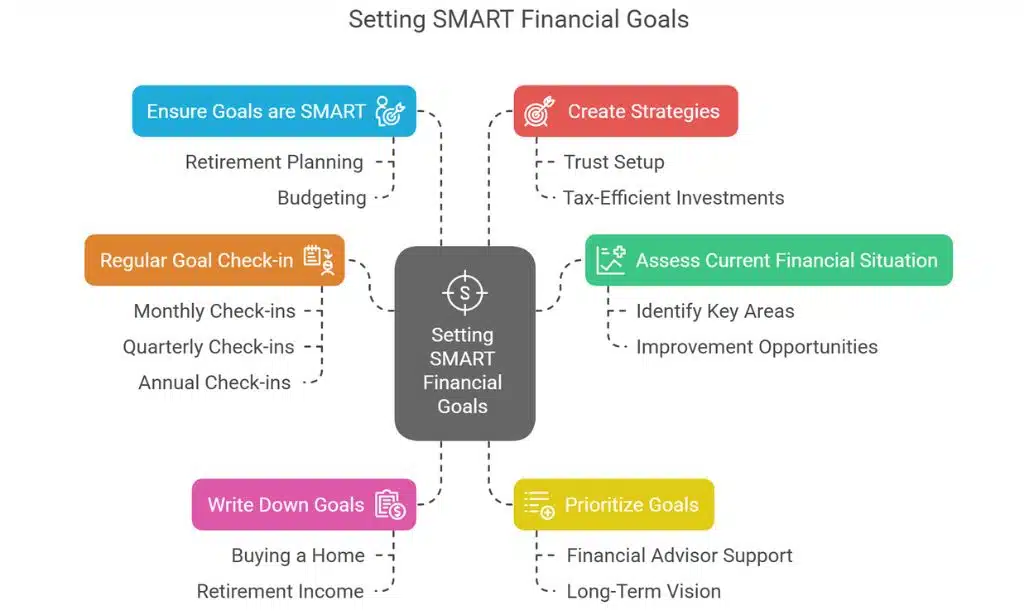“UBS Financial Services Inc. paid advertisement.”
Whether you’re just starting out or have been investing for years, clear financial goals are key to shaping the future you want. These goals serve as your roadmap, helping you stay on track, even during uncertain times. Let’s dive into why financial goals matter and how to set them.
Why financial goals matter
Setting financial goals is a key aspect of wealth planning that can help eliminate guesswork when making life’s big financial decisions. When you step back and set financial goals, it can benefit your life in many ways, including:
1. Keeping you focused on the big picture
By starting with the end in mind, you can create a future vision of the life you want. This makes it easier to focus on the end game and create the path to get there.
2. Helping you create good money habits
As you define and pursue goals, you’ll gain healthy money habits. This can also help to set a strong example for future generations.
3. Avoiding risky financial behaviors
When you keep clear goals at the front of your mind, it can help you to avoid risky financial behavior, like taking out a high-interest loan you may not need.
4. Creating a sense of financial confidence
As you work toward goals, you may start to feel more in control of your money, which can lead to a sense of financial security and stability.
Setting SMART financial goals
We’ve all heard of SMART goals. These are goals that are specific, measurable, achievable, relevant and time bound. Keep this acronym in mind as you create your financial goals by using the following steps:
1. Assess your where you are and identify key areas you want to change
For example, maybe you’re happy with your emergency fund, but feel like a newbie when it comes to investing. Identify specific areas where you’d like to improve.
2. Write down a list of goals
Start thinking about the categories where you want to change and list measurable goals in each. They might include buying a second home or having a steady income stream in retirement.
3. Prioritize the goals
Now that you have a list of goals, decide what’s most important. This is where the support of an experienced financial advisor can come in handy. They can help develop a strategy that allows you to prioritize your most critical goals and create a plan to achieve your long-term vision.
4. Ensure your top goals are SMART
With the help of your financial advisor, you can start getting even more specific. For example, if you’re planning for retirement, you can say how much of your salary you want to put into your 401[k] each month. A goal to use a budget might turn into scheduling a weekly family budget meeting on Sundays and using a budgeting app to log all transactions.
5. Create strategies that lead to success
Once you’ve made your goals SMART, set yourself up for success by working with your financial advisor to create strategies. This could include setting up a trust or developing a tax-efficient investment strategy tailored to your wealth planning needs. Putting effective strategies into place can make it easier to achieve your goals.
6. Set up a regular goal check-in
Many financial goals may seem to be “set it and forget it.” However, it’s a good idea to check in regularly with your financial advisor to make sure you’re staying on the right track. You might want to check in monthly, quarterly, or even annually. Also, know that you can pivot or adjust as your life or the markets change.
The bottom line
The right goals can help you stay focused on the most important aspects of your financial future. Setting clear goals and consistently monitoring progress with your financial advisor can help you go further, and have more confidence in achieving everything that’s important to you. This means making the most of your wealth to live your best life, securing your legacy for generations to come, and creating meaningful impact.
Source:
https://www.sciencedirect.com/science/article/abs/pii/S0149718916302580
This material is provided for informational and educational purposes only. It is not intended as investment advice or a recommendation that you take a particular course of action.
Neither UBS Financial Services Inc. nor its employees (including its Financial Advisors) provide tax or legal advice. You should consult with your legal counsel and/or your accountant or tax professional regarding the legal or tax implications of a particular suggestion, strategy or investment, including any estate planning strategies, before you invest or implement.
As a firm providing wealth management services to clients, UBS Financial Services Inc. offers investment advisory services in its capacity as an SEC-registered investment adviser and brokerage services in its capacity as an SEC-registered broker-dealer. Investment advisory services and brokerage services are separate and distinct, differ in material ways and are governed by different laws and separate arrangements. It is important that clients understand the ways in which we conduct business, that they carefully read the agreements and disclosures that we provide to them about the products or services we offer. For more information, please review the client relationship summary provided at ubs.com/relationshipsummary or ask your UBS Financial Advisor for a copy. In providing financial planning services, we may act as a broker-dealer or investment adviser. When we act as investment adviser we charge a separate fee for the service and enter into a written agreement with you. The nature and scope of the services are detailed in the documents and reports provided to you as part of the service.
© UBS 2025. All rights reserved. UBS Financial Services Inc. is a subsidiary of UBS Group AG. Member FINRA/SIPC.





































